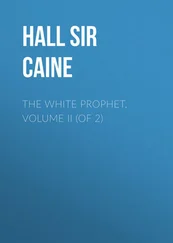Hall Caine - The Bondman - A New Saga
Здесь есть возможность читать онлайн «Hall Caine - The Bondman - A New Saga» — ознакомительный отрывок электронной книги совершенно бесплатно, а после прочтения отрывка купить полную версию. В некоторых случаях можно слушать аудио, скачать через торрент в формате fb2 и присутствует краткое содержание. ISBN: , Жанр: foreign_antique, foreign_prose, на английском языке. Описание произведения, (предисловие) а так же отзывы посетителей доступны на портале библиотеки ЛибКат.
- Название:The Bondman: A New Saga
- Автор:
- Жанр:
- Год:неизвестен
- ISBN:http://www.gutenberg.org/ebooks/33999
- Рейтинг книги:4 / 5. Голосов: 1
-
Избранное:Добавить в избранное
- Отзывы:
-
Ваша оценка:
- 80
- 1
- 2
- 3
- 4
- 5
The Bondman: A New Saga: краткое содержание, описание и аннотация
Предлагаем к чтению аннотацию, описание, краткое содержание или предисловие (зависит от того, что написал сам автор книги «The Bondman: A New Saga»). Если вы не нашли необходимую информацию о книге — напишите в комментариях, мы постараемся отыскать её.
The Bondman: A New Saga — читать онлайн ознакомительный отрывок
Ниже представлен текст книги, разбитый по страницам. Система сохранения места последней прочитанной страницы, позволяет с удобством читать онлайн бесплатно книгу «The Bondman: A New Saga», без необходимости каждый раз заново искать на чём Вы остановились. Поставьте закладку, и сможете в любой момент перейти на страницу, на которой закончили чтение.
Интервал:
Закладка:
The Bondman: A New Saga
Note
The central date of this story (a Saga in the only sense accepted among Icelanders) is 1800, when Iceland, in the same year as Ireland, lost the last visible sign of her ancient independence as a nation. But, lest the historical incidents that stand as a background to simple human passions should seem to clash at some points, I hasten to say that I have not thought it wise to bind myself to the strict chronology of history, Manx or Icelandic, for some years before and after. I am partly conscious that the Iceland I have described is the Iceland of an earlier era; but Icelanders will not object to my having tried to bring within my too narrow limits much of what is beautiful and noble and firing to enthusiasm in their old habits, customs and laws. To the foolish revolt which occurred at Reykjavik early in this century I have tried to give the dignity of a serious revolution such as, I truly think, Icelanders may yet make in order to become masters in their own house. For a great deal of my data towards this sort of secondary interest I am indebted to many books, Icelandic and English; and for some personal help I owe my thanks to Herra Jon A. Hjaltalin of Modruvellir, who is not, however, to be charged with my mistakes – too numerous I have no doubt. For my descriptions of Icelandic scenes and character I can claim no authority but that of my own observation.
H. C.Hawthorns,
Keswick.
The Bondman
Proem
There is a beautiful Northern legend of a man who loved a good fairy, and wooed her and won her for his wife, and then found that she was no more than a woman after all. Grown weary, he turned his back upon her and wandered away over the mountains; and there, on the other side of a ravine from where he was, he saw, as he thought, another fairy, who was lovely to look upon and played sweet music and sang a sweet song. Then his heart was filled with joy and bitterness, and he cried, "Oh, that the gods had given me this one to wife and not the other." At that, with mighty effort and in great peril, he crossed the ravine and made towards the fairy, and she fled from him; but he ran and followed her and overtook her, and captured her and turned her face to his face that he might kiss her, and lo! she was his wife!
This old folk-tale is half my story – the play of emotions as sweet and light as the footsteps of the shadows that flit over a field of corn.
There is another Northern legend of a man who thought he was pursued by a troll. His ricks were fired, his barns unroofed, his cattle destroyed, his lands blasted, and his firstborn slain. So he lay in wait for the monster where it lived in the chasms near his house, and in the darkness of night he saw it. With a cry he rushed upon it, and gripped it about the waist, and it turned upon him and held him by the shoulder. Long he wrestled with it, reeling, staggering, falling and rising again; but at length a flood of strength came to him and he overthrew it, and stood over it, covering it, conquering it, with his back across his thigh and his right hand set hard at its throat. Then he drew his knife to kill it, and the moon shot through a rack of cloud, opening an alley of light about it, and he saw its face, and lo! the face of the troll was his own!
This is the other half of my story – the crash of passions as bracing as a black thunderstorm.
CHAPTER I.
Stephen Orry, Seaman, of Stappen
In the latter years of last century, H. Jorgen Jorgensen was Governor-General of Iceland. He was a Dane, born in Copenhagen, apprenticed to the sea on board an English trader, afterwards employed as a petty officer in the British navy, and some time in the command of a Danish privateer in an Alliance of Denmark and France against England. A rover, a schemer, a shrewd man of affairs, who was honest by way of interest, just by policy, generous by strategy, and who never suffered his conscience, which was not a good one, to get the better of him.
In one of his adventures he had sailed a Welsh brig from Liverpool to Reykjavik. This had been his introduction to the Icelandic capital, then a little, hungry, creeping settlement, with its face towards America and its wooden feet in the sea. It had also been his introduction to the household of the Welsh merchant, who had a wharf by the old Canning basin at Liverpool, a counting-house behind his residence in Wolstenholme Square, and a daughter of five and twenty. Jorgen, by his own proposal, was to barter English produce for Icelandic tallow. On his first voyage he took out a hundred tons of salt, and brought back a heavy cargo of lava for ballast. On his second voyage he took out the Welshman's daughter as his wife, and did not again trouble to send home an empty ship.
He had learned that mischief was once more brewing between England and Denmark, had violated his English letters of marque and run into Copenhagen, induced the authorities there, on the strength of his knowledge of English affairs, to appoint him to the Governor-Generalship of Iceland (then vacant) at a salary of four hundred pounds a year, and landed at Reykjavik with the Icelandic flag, of the white falcon on the blue ground – the banner of the Vikings – at the masthead of his father-in-law's Welsh brig.
Jorgen Jorgensen was then in his early manhood, and the strong heart of the good man did not decline with years, but rode it out with him through life and death. He had always intended to have a son and build up a family. It was the sole failure of his career that he had only a daughter. That had been a disaster for which he was not accountable, but he prepared himself to make a good end of a bad beginning. With God's assistance and his own extreme labor he meant to marry his daughter to Count Trollop, the Danish minister for Iceland, a functionary with five hundred a year, a house at Reykjavik, and another at the Danish capital.
This person was five-and-forty, tall, wrinkled, powdered, oiled, and devoted to gallantry. Jorgen's daughter, resembling her Welsh mother, was patient in suffering, passionate in love, and fierce in hatred. Her name was Rachel. At the advent of Count Trollop she was twenty, and her mother had then been some years dead.
The Count perceived Jorgen's drift, smiled at it, silently acquiesced in it, took even a languid interest in it, arising partly out of the Governor's position and the wealth the honest man was supposed to have amassed in the rigorous exercise of a place of power, and partly out of the daughter's own comeliness, which was not to be despised. At first the girl, on her part, neither assisted her father's designs nor resisted them, but showed complete indifference to the weighty questions of whom she should marry, when she should marry, and how she should marry; and this mood of mind contented her down to the last week in June that followed the anniversary of her twenty-first birthday.
That was the month of Althing, the national holiday of fourteen days, when the people's law-givers – the Governor, the Bishop, the Speaker, and the Sheriffs – met the people's delegates and some portion of the people themselves at the ancient Mount of Laws in the valley of Thingvellir, for the reading of the old statutes and the promulgation of the new ones, for the trial of felons and the settlement of claims, for the making of love and the making of quarrels, for wrestling and horse-fighting, for the practice of arms and the breaking of heads. Count Trollop was in Iceland at this celebration of the ancient festival, and he was induced by Jorgen to give it the light of his countenance. The Governor's company set out on half-a-hundred of the native ponies, and his daughter rode between himself and the Count. During that ride of six or seven long Danish miles Jorgen settled the terms of the intended transfer to his own complete contentment. The Count acquiesced and the daughter did not rebel.
Читать дальшеИнтервал:
Закладка:
Похожие книги на «The Bondman: A New Saga»
Представляем Вашему вниманию похожие книги на «The Bondman: A New Saga» списком для выбора. Мы отобрали схожую по названию и смыслу литературу в надежде предоставить читателям больше вариантов отыскать новые, интересные, ещё непрочитанные произведения.
Обсуждение, отзывы о книге «The Bondman: A New Saga» и просто собственные мнения читателей. Оставьте ваши комментарии, напишите, что Вы думаете о произведении, его смысле или главных героях. Укажите что конкретно понравилось, а что нет, и почему Вы так считаете.












